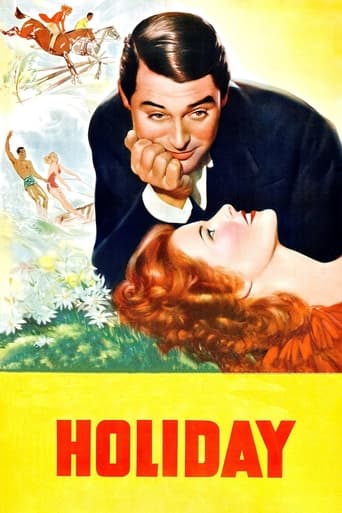dsmith-25000
Seeing it again, I realize that the morals of the story are:
Rich is Bad; Poor is Good
Rich is Unhappy; Poor is Happy
Rich is pro-Nazi (see comment about "right kind of government" from Seton cousin Cram); Poor is anti-Nazi (See Johnny Case reaction)
Hollywood composed of the richest non-business men in the then world pushing these ideals may have satisfied audiences of the depression decade, but don't work today. And weren't true then or now.
HotToastyRag
Right on the heels of the wildly popular Bringing Up Baby, Cary Grant and Katharine Hepburn reunited for their third screen pairing in the screwball comedy Holiday. Once again, Cary plays a well-to-do classy gent whose life plan is unhinged by free spirit Kate. There are pratfalls and silly gags, and everything Bringing Up Baby has—except the leopard. So, if you're like me and only liked the wildcat, you're going to want to skip Holiday.Cary is engaged to Doris Nolan, but her sister Kate catches his eye, and soon he's involved in the madcap hilarities of their entire family, including Lew Ayres and Henry Kolker. There's a giant holiday party, some misunderstandings, and a lot of tumbling. Cary Grant was famous for saying he "ran away with the circus" when he decided to pursue a career in show business, so if you're interested in seeing his hidden acrobatic talents, you can rent Holiday and see his backflips and headstands. Besides that, unless you're a die-hard fan of the screwball genre, you might want to find another Cary or Kate movie to watch, like Notorious or Little Women.
Dalbert Pringle
Everything that "The Philadelphia Story" was, "Holiday" wasn't.If the point of Holiday's story was to convince me that the incredibly rich were just a bunch of boring, stuffy, petty, snivelling, tantrum-throwing, one-dimensional goofs (Yeah. That about covers it), then, yes, it certainly achieved its intended goal quite successfully.Holiday is a prefect example of why I generally detest and often avoid watching "Screwball" comedies from the 1930s and 40s.Its story was so contrived, predictable and riddled with every "poor-little-rich-girl" cliché in the book that it made my skin absolutely crawl in complete revulsion to everything that it supposedly stood for.One aspect of Holiday's "far-from-believable" story that really killed me had to do with the 3 spoiled-brat children (who were all around the age of 30) of wealthy banker, Edward Seton.These 3 big sucks clearly resented "daddy-dearest" for the dominating and (apparent) strangle-hold that he had on their lives. Yet these 3 little whining cry-babies continued to live under the same roof with this overbearing, money-grubbing, Wall Street monster. And that, to me, rendered them all a bunch of selfish, temperamental, hypocritical wimps as they greedily guzzled down his booze and paraded around in all of their tres' chic, designer outfits.Holiday was the sort of film whose story really sent out a very confused and mixed message about the super-wealthy set. It just couldn't decide whether it wanted the viewer to laugh at them, or to hate them, or to enviously desire to be just like them. But, whatever - This film's story was "Screwball" comedy at its absolute most detestable, in my opinion.And, besides all of that nonsense, I definitely thought that the chemistry between its 2 big-name stars, Katharine Hepburn and Cary Grant, stank, big-time. And that's because there really was no chemistry between these 2, whatsoever.Of the 4 principal characters who dominated Holiday's story, it was Cary Grant's "I-just-wanna-bum-around-for-the-rest-of-my-life" role as John Case who rang the most false and pretentious.Immaculately groomed in his tailor-made suites and shiny shoes, I wasn't convinced, for even a minute, that this "good egg" wasn't even phased one bit by the possibilities available to him through all of Seton's financial wealth. To me, Case's phony, non-materialistic philosophy didn't hide the fact that beneath his apparent selfless intentions lurked a greedy, little gold-digger just waiting to pounce on all that dough.
aysx87
This film was boring... super boring... super predictable. A successful idealistic young man meets his wealthy fiancé's family for the first time -- and they're rich... and shallow... and try to make him ~make money... and be more successful... and are shallow... and judgmental... and talk about people behind their back. He just wants to spend a few months or years travelling the world aimlessly. He meets his match in a jaded young woman played by Katherine Hepburn. All the lines are clichés, which basically have the meaning 'being rich or successful doesn't matter, what matters is being happy!' and 'rich people are shallow.' This movie feels dated and Linda's angst comes across as just spoiled; I find it very hard to relate to her. She's also extremely actressy and overdone in this film, giving long and dramatic monologues about her situation (as a rich beautiful young woman who's the black sheep of her family and refuses to settle down.) I really don't get the problem, there seems to be no plot, and while Cary Grant is as charming and insightful as ever he doesn't seem to quite mesh with the incredibly unlikable Hepburn. I did like the dissolute brother, who played a part with humor. And of course the lovely scenery and costumes of the period, almost over the top.








